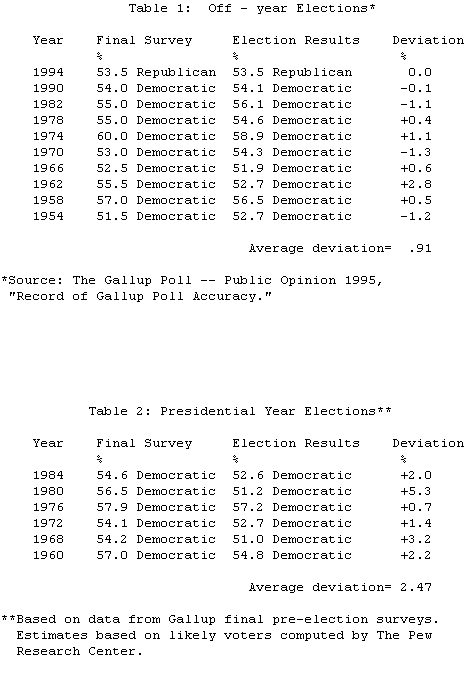The polling lesson of 1994 was learned first by the Gallup Poll in the 1950’s… that a generic measure of partisan support for House races in a nationwide poll can do a good job of estimating the popular vote for the Congressional election. Consequently, it is an excellent basis for predicting the number of seats each party will win in the House, given the historical relationship between the way the popular vote divides among Democrats and Republicans and the number of seats each party wins. Note: The generic opinion question asks voters whether they would vote for the Republican or the Democrat in their district if the Congressional election were being held that day.
Analysis of Gallup data over the years, however, shows that forecasts of the popular vote for Congress based on national surveys in presidential years have been less accurate than those in off-years. In fact, Gallup never released the results of its Congressional preference question in presidential years. In off years, the Gallup accuracy record is superlative. Its estimate of the popular vote has an average error of less than 1 percentage point (0.91). (See table 1). However generic Congressional results in presidential years — which Gallup collected but never published — are a less accurate predictor of the popular vote. The average error in presidential year elections for which data is available was almost 2.5 percentage points. (See table 2). Note: Alec Gallup, Co-Chairman of the polling organization, recalled concerns about question order effects and general lack of interest in the Congressional races in this era of Democratic party dominance as reasons why these results were not published by the Gallup Poll.
It is not clear why the generic question does not work as well in presidential years. It may be related to the ordering of questions in the polls. In presidential years, the Congressional preference question is asked after the question about Presidential preference in order not to influence the answers in the more important presidential race. In off years, of course, there is no presidential contest which could affect the responses. Against this argument, however, is the fact that the errors are not the result of a band wagon effect. For example, the largest single error was an overestimate of support for Democratic candidates in 1980, when Reagan and the Republicans achieved a big win.
An alternative explanation might be that the smaller bloc of voters in off years consider more thoroughly their voting intentions than do the larger number who vote in presidential years and who may make their Congressional choices at the last minute and more capriciously.
Whatever the reason, poll watchers should not rely as much this year on the accuracy of the generic measure as they did in 1994.
